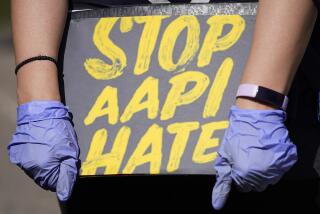Study: Asians Smoke More Than Thought
- Share via
Taking one last drag on his cigarette before his smoke break ended, Garden Grove mechanic Jason Park admitted Wednesday to a sense of guilty pleasure.
“I know it’s supposed to be bad for me, but I enjoy it too much,” he said.
Park’s two decades as a smoker began with a single puff among friends during his teens in Korea. Now he’s up to two packs on some days.
“I’ve been smoking for a long time, since I was a boy,” he said. Although he knows some of the health risks, Park said he wasn’t aware that tobacco is physically addicting.
His attitude is common among Vietnamese and Korean men, where the smoking rate is 32%, which is higher than among white men, according to a national study released Wednesday.
The survey, conducted by the National Asian Women’s Health Organization, contradicts earlier studies done by the Centers for Disease Control and Prevention that say Asian Americans are the least likely ethnic group to smoke.
“There’s a public perception that smoking is not a serious problem among Asian Americans, but the reality is that it’s as bad or worse in certain Asian groups,” said Mary Chung, president of the San Francisco-based organization that devotes itself to advocating health among Asian American women. She unveiled the study during a White House briefing earlier this week.
The survey was conducted over two months ending in January and specifically polled Korean American and Vietnamese American men and women. There were 811 participants nationwide. Among the key findings:
* There’s a much higher prevalence of smoking among Asian American men than previously reported. Some 34% of Vietnamese Americans and 31% of Korean Americans polled were current smokers. The overall rate for white men is 28%. Earlier CDC studies indicated that 13.9% of all Asian Americans smoke.
* Many Asian Americans are not aware of the health risks associated with smoking. Of those surveyed, 34% of Vietnamese Americans and 12% of Korean Americans did not know that smoking is addictive. One in five of both groups did not know that smoking causes heart disease, bronchitis, emphysema, and other health problems.
* In their homes and work, Asian American women are heavily exposed to secondhand smoke. Some 31% of Korean American women and 27% of Vietnamese American women reported they are exposed to secondhand smoke in their homes. In the workplace, 41% of Korean American women and 27% of Vietnamese American women are exposed to secondhand smoke.
* Many smokers begin in their teen years. The survey showed that 52% of Vietnamese Americans and 33% of Korean Americans tried their first cigarette at 18 or younger.
“Our findings show that government intervention programs are not effectively reaching the Asian American population,” Chung said.
For example, lung cancer is the single leading cause of preventable death among Asian American women. With nearly one-third of Asian American women reporting that they are exposed to secondhand smoke, the government should become much more proactive in reaching this population, Chung said.
Chung said her group is using the study’s results to encourage the federal government to reevaluate the way it collects health data from ethnic communities.
Their survey is the first to query participants in their native languages. Although about half of the respondents said they could read and speak English, 86% asked to be questioned in their native language. All CDC studies involve questions posed in English only.
“Surveys that are in English only tell us part of the story,” Chung said “When the CDC gathers to decide what groups gets tobacco-control funding and resources, Asian Americans are not considered an at-risk group. Our study shows that we definitely should be.”






